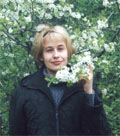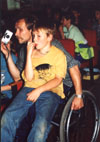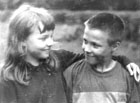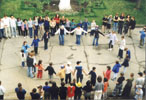An island of tolerance:
(an experience of an integral camp "Our house home")*
Lubov Gribanova
 The bus doors opened and the area ground in front of a camp building was filled with a crowd of boys and girls. Through children's hubbub a cook lady Masha managed to hear "Look out, the steps!" and right now a thin boy with a walking stick appeared on the threshold, and two half-breed girls and a girl in a wheelchair followed him. "How will they live here? They need special care", - murmured lady Masha running towards Dimka and heard in answer: "I'll do it myself!" The bus doors opened and the area ground in front of a camp building was filled with a crowd of boys and girls. Through children's hubbub a cook lady Masha managed to hear "Look out, the steps!" and right now a thin boy with a walking stick appeared on the threshold, and two half-breed girls and a girl in a wheelchair followed him. "How will they live here? They need special care", - murmured lady Masha running towards Dimka and heard in answer: "I'll do it myself!"
Dima is always hurt when he is treated like a baby little boy. When people for the first time see a fragile blind boy the size of a thumb hop-o'-my-thumb or Tom Thumb, they don't even take into their heads that he is fourteen. He looks as if he were only seven. Rejecting other's help Dimka asserts his independence. A couple of times he reaches the canteen with a guide and then gets there himself. He is an indolent, thoughtful teenager - a exact opposite to his younger sister. Unlike her brother she goes to a common Moscow school and lives with her parents at home. However, in several years she also may have to attend a boarding school for children with bad sight. Her eyesight is decreasing.
Among the participants of this unusual, in an average man's opinion, camp there is a lot of those who suffer from an inherited loss of sight. There are also children with the malfunction of supporting motive motor organs system?. There are those whom we call children from socially unprotected families: having many children, incomplete and not sufficiently provided poor families. Thus, mother of red-haired twins Masha and Dasha is bringing up three girls alone. And five-year Vovka after his parents death was left in the charge of his grandmother, a school-teacher. She couldn't hunt up the money for a journey to the sea, so the grandchild was to spend the summer in stuffy Moscow. Suddenly a colleague offered to take the boy with her. After a little hesitation the grandmother agreed. And the third year running Vovka, who became a general favorite, is included in the lists of participants of the integral camp "Our house home".
The first such camp was held organized or established in 1993 in on the initiative of Irina Demakova, a professor at APK&PRO (Academy of Upgrading of Professional Skills and Retraining of Education Officials), and a student Ulia Chikhacheva. Having attended a camp for children with bad sight, the girl proposed the students and beginning teachers-beginners from the youth center "Our house" of the Russian society of named after Yanush Korchak to organize their own camp, only of a mixed type, both for orphans and children from complete families, invalids and healthy. After all, children suffering from their difference from others, and in consequence, from their inferiority, shouldn't be restricted by the walls of boarding schools and their own flats. They need communication in the society. Why not do it through the organization of joint rest? Holiday?
The young people tried to work with deaf children from Taganrog and deaf-blind children from Serguiev Possad, but came to a conclusion that for a layperson amateurs it were very difficult to get on with them. They had to give up an idea to take children with mental deflections in development and those who have constantly to take medicines, for example, diabetics. In case of necessity team-leaders just wouldn't be able to render a qualified assistance medical aid.
On the whole, according to the organizers' calculations estimation, only 10% of the children, visiting the camp, are from so-called "successful": non-conflict and well provided wealthy, in Moscow criterion, families.
Others just cannot afford an out-of-town rest, especially in the South. Meanwhile, during the eight years of the existence of the "Our house" center camp program children managed to visit Solotch and Temruk, Sudac and Taganrog, Evpatory and Puschin... The cost of a road ticket and plus each place in a not the most very comfortable recreation department center is about 200 dollars. They gain grants of Russian and foreign charitable funds, and also use the sponsors' assistance. When on the eve of the August crisis "Our house" was invited to Holland, an inviting side undertake undertook all the expenses on accommodation and nourishment of the children on children's meals and accommodation. It remained only to find the money for the tickets. Then the leaders wrote dossiers about almost 100 children and started visiting the offices of familiar businessmen. An explanation of the reasons why this very child should see the world affected the business representatives more than a faceless phrase "Help the destitute".
 Well, everything is clear with orphans and children from poor families. But you will ask, what for do the children of well-provided wealthy parents go to Svetlogorst of near Moscow Puschino? The tours are cheap, living conditions in the camp are not the best. Children are fed by cooked semolina and macaroni, and their parents are asked not to give their off-springs too much pocket-money. You see, they will live with the children of the same age, for whom even 10 Rubles spent on chocolate may prove an inadmissible luxury. Well, everything is clear with orphans and children from poor families. But you will ask, what for do the children of well-provided wealthy parents go to Svetlogorst of near Moscow Puschino? The tours are cheap, living conditions in the camp are not the best. Children are fed by cooked semolina and macaroni, and their parents are asked not to give their off-springs too much pocket-money. You see, they will live with the children of the same age, for whom even 10 Rubles spent on chocolate may prove an inadmissible luxury.
 For somebody the words about "inculcating of mercy and compassion" will seem pompous and unconvincing. But we still believe that the communication of "different" children will leave a trace in their soles SOULS. Never afterwards will the "successful" push a man with a walking stick in the street, never they will be sitting with a blank look in the underground car, occupying the seats for invalids, or poke their fingers into people with other color of skin. And Fear and hatred of the children, whose life is more difficult than the lives of other children of their age, won't become the feelings, prevailing in the relations with other people. To achieve it this purpose , it is not necessary to know the modern word "tolerance" or bring in schools the lessons of forming a tolerant attitude towards people of different nationality, religion or appearance (the list of differences can be continued endlessly). It is sufficiently just to live in one tent side by side with an obstinate Dimka or a risible Vovka, thoughtful Irochka, who lost both legs in an accident, and with Jenia and Katia born from an Afro-American father. For somebody the words about "inculcating of mercy and compassion" will seem pompous and unconvincing. But we still believe that the communication of "different" children will leave a trace in their soles SOULS. Never afterwards will the "successful" push a man with a walking stick in the street, never they will be sitting with a blank look in the underground car, occupying the seats for invalids, or poke their fingers into people with other color of skin. And Fear and hatred of the children, whose life is more difficult than the lives of other children of their age, won't become the feelings, prevailing in the relations with other people. To achieve it this purpose , it is not necessary to know the modern word "tolerance" or bring in schools the lessons of forming a tolerant attitude towards people of different nationality, religion or appearance (the list of differences can be continued endlessly). It is sufficiently just to live in one tent side by side with an obstinate Dimka or a risible Vovka, thoughtful Irochka, who lost both legs in an accident, and with Jenia and Katia born from an Afro-American father.
It is clear that nobody in the camp divides segregates one participant from another. the participants of the camp shift. And nobody accents stresses attention on their differences. In the camp everybody follows the principle: all the children are equal, so there are no indulgences or discrimination. For all the camp history only once a child was sent home before the end of the shift. Then both tolerant team-leaders and children, who nearly thrashed the Bad Boy, revolted. The spoilt boy was brought up by numerous nurses, tormented everybody by the demands like "Bring my white socks!" or "Potatoes are not fried enough! Cook another ones!"
As a rule, to the end of the first week the dweller of the "island of tolerance" manage to get on. Of course, everything happens. "Home" children may also shake their fists and say that they don't like porridge and aren't going to get up with everybody. "Boarding school" children show their bad tempers too. But whether you like it or not, there are certain rules in the camp. And everybody understands that if your riot is not caused by a serious reason but by a common caprice, next time nobody will take you with them. Drinking strong drinks is tabooed, smoking isn't encouraged. There also happen thefts, but in the teachers' opinion in such cases we should act very carefully, since kleptomania is an illness.
For someone it is enough to talk with his leader or other trusted person, right up to the camp director. May be, he hasn't found mutual understanding with a new leader. And it's awkward you feel uneasy to confess to an unknown person that your room-mates don't suit you or you are eager to return home... The behavior of others may be considered at a session of the children parliament, that consists of the members from each group, or rather "family" (a little bit later about it). Participants of the camp Camp-dwellers live according to the laws of a democratic society, paying attention not only to the elders but to the parliamentarians' opinions. If an islander thinks that he was treated wrong he may write about it in on a bulletin board an information board. Here, on a free space, between the messages "I've crazy!" and "I'm tired of listening to Alena Apina. I want to dance to the songs of Sviridova!". The camp direction will read and return their verdict. Another way is to apply to the editors of the newspaper "Days of our life". By the way, its founder is Andrei Verglinsky, a teacher of literature, a winner of the Moscow competition "The best teacher of the year (1999)".
But as a rule conflict situations are not put for universal schooling, but discussed in own within "families" where the leaders share the roles of fathers and mothers, and children have to play themselves. Long before holidays the "parents" contrive an image of the family of the Ivanovs or the Petrovs (children are given names by the father-leaders). Here everything depends on imagination and artistry of the leaders. If you play the guitar - you may become a musical family, if you are ready to be in charge of the newspaper - you will be an "informational" family. Once a leader from Holland came to the camp (a common practice for an integral camp, where not only Muscovites, but young people from other Russian cities and from abroad come to work). Duncan de Chikko proved to be a Dutchman of an Italian birth, moreover an aristocrat. To everybody's delight the family de Chikko became a "royal" family. The moment princes and princesses began to behave ill, the king threatened the naughty children to alter his will.
So, all the leaders work with children without pay. Students and teachers choose their leave time fitting to meet the next trip. Some of them, like Andrei or Marina Zhidkova, a teacher of physics, have visited the camp form the time of its establishment. Leaders-newcomers are trained by the present and former leaders and the teachers from APK&PRO. Also free of charge. "Here is this famous Russian altruism!" - you will would say and be wrong. Two of Duncan's countrymen compatriots, having once visited our integral camp while teenagers, they come here again and again. They take leave and at their own expense arrive in Russia.
Another feature of "Our house" is attracting to the work as leaders its former inmates including the blind and " wheelchair men". Thirty years old Natasha is a speech therapist. She heads the ....... She has visited the camp for several years, made an interval only for delivery time. The girls from the boarding house for the blind who teach English to the children are their favourites. For the first time seeing a blind man children quickly get accustomed to him. And soon become his "eyes" of their own free will.
 The examples of an amazing for our cynical and cruel time "insular" brotherhood may be set endlessly. But there is an end to everything. And children and teenagers who have made friends during the camp shift have to return to usual biotope. It means that again they need to try to get on with unready to accept you as you are boys in the yard, classmates and chance passer-by. Because nobody has canceled your uncertain because of the crutches walk, hair, curly like a wire, and swarthy skin of a status of an orphan. In Marina Zhidkova's opinion, such children are not always tormented at school and in the street. It's quite another matter is understanding that they are not the same as most of children of their age. And too many things depend on the adults stand. Marina herself faced a case of rejection of a new girl by her class. When Masha came to school a quiet and shy girl was given a hostile reception. Boy in every way trained the girl with a bad sight. Besides, in their teens boys treat close contacts badly and try to keep some distance away. Every now and then screwing up her eyes the girl tried to perceive a sum in the copy-books of her desk-mates. It caused irritation. It took Marina and her colleagues almost a year to normalize the situation. The examples of an amazing for our cynical and cruel time "insular" brotherhood may be set endlessly. But there is an end to everything. And children and teenagers who have made friends during the camp shift have to return to usual biotope. It means that again they need to try to get on with unready to accept you as you are boys in the yard, classmates and chance passer-by. Because nobody has canceled your uncertain because of the crutches walk, hair, curly like a wire, and swarthy skin of a status of an orphan. In Marina Zhidkova's opinion, such children are not always tormented at school and in the street. It's quite another matter is understanding that they are not the same as most of children of their age. And too many things depend on the adults stand. Marina herself faced a case of rejection of a new girl by her class. When Masha came to school a quiet and shy girl was given a hostile reception. Boy in every way trained the girl with a bad sight. Besides, in their teens boys treat close contacts badly and try to keep some distance away. Every now and then screwing up her eyes the girl tried to perceive a sum in the copy-books of her desk-mates. It caused irritation. It took Marina and her colleagues almost a year to normalize the situation.
How much effort and time should be put in the upbringing of rising generation in order to refrain from repetition of the recent tragedy in Tsaricino, and to avoid perceiving integral camps as islands in the world of indifference and intolerance?
A quotation
"A joint upbringing of different children - invalids and comparatively healthy, orphans and relatively domestic - I called a joint pedagogics in my books.
Meeting regularly and for some time living together children learn to understand each other, gain an adequate idea of the opportunities of each other, getting rid of prejudices they learn to help each other - and understand that even the most helpless, as it may seem, invalid in some way can help even the most "normal". Quite a lot of children's organizations in Russia are engaged in such pedagogical work... a joint pedagogics may assist in forming the skills of self-defense (also personal self-development), creating favourable conditions for intensive work of the sole, including solitary one".
Alekxander Suvorov, Doctor of Psychological Science, professor of the University of Russian Academy of Education, possessor of a gold Lev Tolstoi medal, full member of International Academy of informatization under the U.N.O., former inmate of the Sergievo-Posad boarding school for blind and deaf-and-dumb children. (Collected articles of XI International conference-exhibition "Informational technologies in education", part VI)
From the forms for the camp participants
"My place in the camp is along with everybody"...(a blind boy)
"In the camp I cannot feel that nobody needs me"...
"In the camp I knew that I am loved. I learned to love and be a friend"...
"The most important thing for me is that nobody hurt me in the camp"...(a half-breed child)
"I learned that I could do something good for people"...(A blind girl for a boarding school)
"I am understood here"...
"Everybody were on friendly terms with me, communicated, were like a whole family"...(a boy is brought up by a grandmother)
"Our house" is my house"...(an inmate of a Child's House)
*The names of children in the article are changed.
|